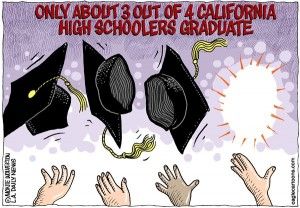School reformers aim for teacher evaluations
By Katy Grimes
Efforts in California to usher in teacher and school administrator accountability have been nearly impossible due to opposition from the teachers’ unions. But some reformers aren’t giving up, including in the Democratic Party.
Sen. Ron Calderon, D-Montebello, has authored SB 441, attempting reform one more time. Thus far, it appears he has bipartisan support. But the hurdle to overcome in the past has not been achieving bipartisan support; the hurdle has been overcoming the teachers’ and school employee labor unions, and the politicians they support.
Democrats divided
At last month’s California Democratic Party Convention, Democrats killed efforts led by other Democrats to call for much needed public school reforms.
Convention delegates even passed a resolution slamming education reform groups like StudentsFirst and Democrats for Education Reform, claiming they are merely front groups for Republicans and Wall Street money.
The stark divide appears to be between supporters of the California teachers’ unions on the one hand; and on the other hand, supporters of school choice and linking teacher evaluations to student performance.
I talked recently with Jessica Ng, Communications Director at StudentsFirst, about the possibility of school reforms. StudentsFirst is a grassroots school reform advocacy group.
“We’re pleased Sen. Calderon has taken on the issue of improving teacher evaluations, and we particularly applaud his effort to base SB 441 on the guidelines laid out by the Obama administration,” Ng said. “We believe that this conversation is an important one because a strong teacher and principal evaluation system is critical to improving student learning, and we’re glad to be part of the broad-based coalition supporting Sen. Calderon’s bill.”
But many teachers blame students and their parents, complaining about the “poor quality of students” public schools have to deal with.
But some scholars look at teachers. “Teacher quality is the key to improved schools,” said Eric Hanushek in his book, “Teacher Quality.” Hanushek is a senior fellow at Stanford’s Hoover Institution.
“Teacher quality cannot be readily linked to teacher characteristics; therefore new and more extensive certification and training standards are unlikely to be effective,” said Hanushek. “Policies aimed at student performance instead of inputs (like more education spending) offer the only real hope for improvement.”
What SB 441 would do
Calderon’s bill amends various provisions of existing laws governing the evaluation of certificated employees. It would, according to a Senate analysis:
* Require the evaluations to use multiple measures, including a minimum of four rating levels.
* Increase the frequency of evaluations for teachers with 10 or more years of experience in a school district from every five years to every three years.
* Require school districts to avail themselves to the input of parents, according to Senate analysis.
According to Calderon, the current teacher evaluations process under the Stull Act has proved to be insufficient in the recognition of high performing teachers and the identification of those that could benefit from professional development. Under the Stull Act, passed in 1971, a school district must include student achievement as part of a teacher’s evaluation.
Recently the Los Angeles Unified School District was charged with never having followed the Stull Act. According to education reform experts, the teachers union wouldn’t allow it.
While some districts incorporate student performance in their evaluation systems, others do not. And in districts that simply rate their employees as “meeting” or “not meeting” expectations, teachers may not receive sufficient feedback during the evaluation process to understand how to improve their practice.
Key to this bill, according to Calderon, are several research studies which document the correlation between teacher quality and student achievement. Differential teacher effectiveness is a strong determinant of differences in student learning, far outweighing the effects of differences in class size and heterogeneity, the bill analysis said.
This is correct, according to Marcus Winters, a senior fellow at the Manhattan Institute. In his new book, “How Important Are Teachers?” Winters explained: “Research using the value-added approach consistently finds that teacher quality is the most important factor for boosting student performance. Students with nearly identical backgrounds will perform quite differently on standardized tests depending on which teacher they were assigned.”
There is another hearing on SB 441 Wednesday in the Senate Education Committee. Last week the bill was nearly killed when the committee deadlocked on the vote, but Calderon asked for reconsideration so SB 441 could be heard again Wednesday morning.
Parents, teachers and student advocates feel muzzled
Julie Collier, the executive director of the Parents Advocate League, has spent her Tuesdays and Wednesdays for the last three weeks traveling from Orange County to the Capitol to support student-sponsored legislation. “Unfortunately, three of the four student sponsored pieces of legislation have failed,” Collier said. “Our last hope is SB 441 by Sen. Calderon.”
But perhaps the most bitter aspect for Collier and her group of student advocates was at the hearing last week where Calderon’s bill deadlocked. “Sen. Hannah-Beth Jackson thanked all of the supporters that traveled to Sacramento in support of SB 441,” Collier said. “And then she invited the opponents of the bill, two union lobbyists, to come up to the podium and speak again, after they had already given their testimony.”
Collier added, “It’s disappointing to me, as a former educator and concerned parent, that the paid lobbyists’ seat at the table is apparently more important to the Senator than parents, teachers and student advocates.”
Take a look at the supporters and opponents of SB 441. Will this bill end up as all other education reform bills have — in the waste bin?
SUPPORT
California Mayors (cities of Sacramento, Los Angeles, and San Jose)
California United to Reform Education
EdVoice
Lanai Road Education Action Committee
Los Angeles Unified School District
Office of the Mayor of San Francisco
National Action Network Los Angeles
Orange County Business Council
Parent Partnership
Parent Revolution
Parents Advocate League
San Diego United Parents for Education
Simmons Group Inc.
Stand Up for Great Schools
Students First
Letters from various individuals
OPPOSITION
California Federation of Teachers
California School Employees Association
California Teachers Association
United Teachers Los Angeles
Related Articles
‘Subsidiarity’: About broad push for local control? Or upping teacher pay?
Joel Fox has an analysis piece at Fox & Hounds that looks at the governor’s push for “subsidiarity” on education
Seeking tuition hikes, UC blows millions on computer glitches
Spurred by University of California President Janet Napolitano, the school’s Board of Regents last November voted for 28 percent tuition
Prediction: CTA to play good cop/bad cop on Brown school $ plan
May 23, 2013 By Chris Reed The California Teachers Association has taken a lot of hits of late. It tried





